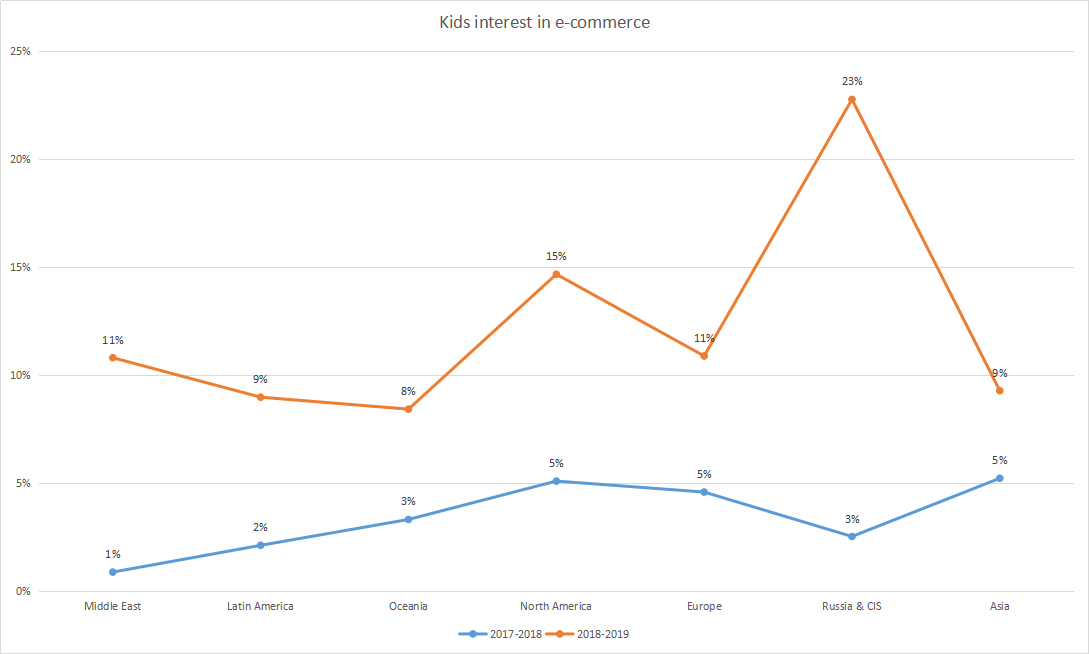• Compared to this time last year, children are becoming more active adopters of e-commerce sites: their interest in online shopping has more than tripled the last 12 months – from 2% to 9%.
• This is according to Kaspersky’s annual report on kids’ safety, which is based on anonymized statistics from Kaspersky’s products with parental control functionality.
The report findings demonstrate that, very much like adults, children are enjoying the benefits of online shopping and are browsing (and sometimes buying) in a way which will probably become the only way to shop in the future. As such, parents need to provide their kids with the right guidance and support, to ensure they have a positive online experience — without the risks of unintentionally sharing personal and payment information with fraudsters, or potentially falling for social engineering scams or suffering money loss. It is therefore vital that parents and other adults in the family stay up-to-date with key changes in children’s online behavior.
According to the statistics, youngsters’ growing interest in e-commerce sites is a global trend, however the extent varies depending on location. According to the report data below, the largest share (and also biggest growth) in online shopping searches has been seen in Russia and CIS (23%). This is followed by a significant percentage gap in other regions: North America (15%), Europe and the Middle East (11%), Asia and Latin America (9%).
Chart 1. Kids interest in e-commerce by region

While there are clearly some regional differences, the most searched for retailers by children across the globe include AliExpress, Amazon and Ebay. When it comes to Chinese retailers in particular, kids’ queries are growing steadily year on year. Sports apparel (Nike, Adidas), electronics (Apple, Samsung), and fashion brands (Gucci, Vans, Supreme, Zara, Bershka) are the most searched for sites among this young consumer audience.
It’s worth noting that searching for goods online, as well as visiting specific retailers’ pages does not necessarily imply actual spending. Kids might just be looking at things they want or compiling ‘wish lists’ to share with friends and family. Therefore, this increased attention towards online shopping by children should not be interpreted as a need to forbid such activities, but rather that parents pay attention to online habits and talk to their children about the possible risks and precautions while establishing some clear ground rules.
“The internet offers a lot of opportunities for kids, and we are now seeing many children becoming a key audience for online retailers. Whether they spend money or not, they need support and guidance from adults who can help them avoid inadvertently coming across inappropriate content, suffering money loss or unnecessarily sharing their personal data. While there are certain things that parental control software can do, it is vital that adults are aware of what their children are doing online and ensure they are armed with all the facts to do it safely. This could be a perfect opportunity for parents to spend time with their kids, creating and sharing wish lists while teaching them some important things about how the internet works”, comments Anna Larkina, web content analysis expert at Kaspersky.
The following advice will ensure your children remain safe on the internet while surfing online shopping websites:
- Warn them about using unreliable (public) Wi-Fi networks for online payments. Hotspots can be easily hacked to intercept user traffic and steal confidential information
- Come to an agreement that they inform you about any planned payments or, even better, conduct all payments with your assistance until they are savvy enough to do it on their own. Never allow credit card details to be entered on unfamiliar or suspicious sites, to avoid them being accessed by cybercriminals
- Instruct them to avoid sharing any personal details with retail personnel, whether via phone or online. Make sure they feel confident about asking for help whenever there’s a problem or they are unsure about the best course of action
- Strictly prohibit sharing payment details (e.g. credit card number, expiration date, PIN, CVV/CVC) with anyone outside the family, including friends or other adults. Make sure they realize that no one is entitled to demand this information from them
- Restrict saving payment information on their devices which, if stolen or lost, could fall into the wrong hands
- Enable parental control functionality in Kaspersky Security Cloud, Kaspersky Total Security or use specialized software such as Kaspersky Safe Kids, which allows parents to monitor what their children do, see or search for online across all devices, including mobile devices. The software also provides useful advice on how to help children behave safely online. Clearly explain the benefits of such software to your children so they feel comfortable about the required control and involvement from adults
To learn more about the findings from Kaspersky’s parental control report for 2018-2019, read here.
























